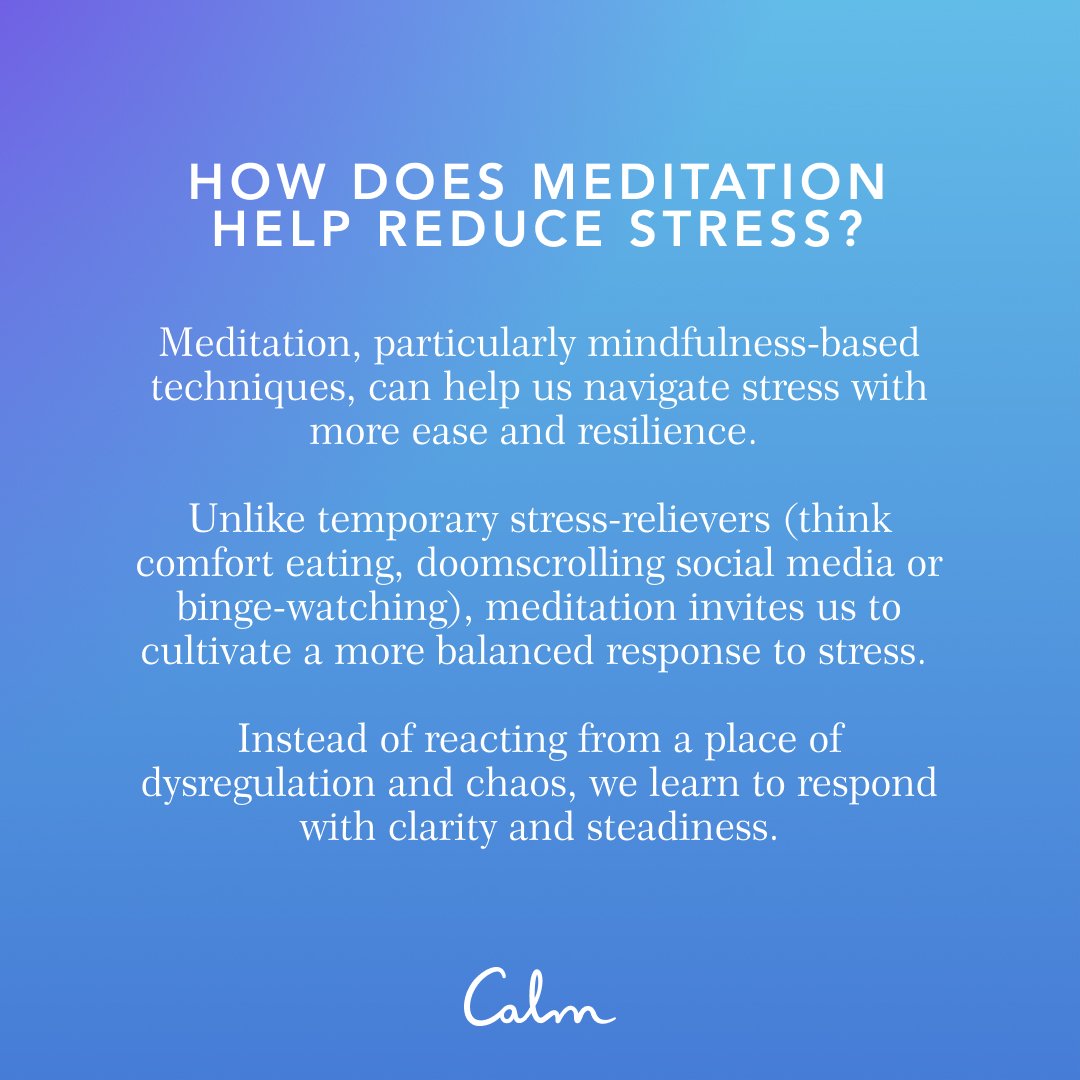Meditation for stress: 11 techniques to manage stress
Stress is part of life, but you can learn to manage it better. We explore what the causes of stress and how meditation and mindfulness techniques can help.
Stress. It’s become a constant companion for many of us, especially when the world seems to be spinning faster and our lives are getting busier. You know the drill: your inbox is overflowing, your work schedule is jam-packed, and you’ve committed to more commitments than you can commit to. It’s no wonder we’re all so stressed.
Stress is the body’s reaction to any change that requires a response. It’s natural, normal, and important in keeping us safe. But when the pace of life ups the ante on stress, it can become harder for us to manage it effectively.
Mindfulness and meditation can help. Rooted in ancient wisdom and backed by science, a regular meditation and mindfulness practice are powerful tools against stress. Before we dive into the how and the why of meditation, let’s take a closer look at the causes of stress itself, and exactly what’s going on in our brains.
What causes stress?
Everyone experiences stress. It’s an inevitable part of life. But where does stress come from exactly, and what triggers it?
Stress triggers are as individual as we are. They can range from work pressure and financial worries, to relationship issues and health concerns. You name it — someone, somewhere is probably stressing about it.
So what makes one person stress more about getting a good night’s sleep while someone else is more concerned about that upcoming trip to the dentist? Our unique set of circumstances, personal history, and individual sensitivities dictate what situations or experiences induce stress in us.
To understand why stress happens in the first place, we need to take a quick detour into the human brain. Deep within the brains’ intricate web of neurons and synapses lies a small structure called the amygdala. This almond-shaped bundle of nerve cells is the brain’s emotional processing hub, which plays a pivotal role in how we experience and react to stress. When we encounter a stressful situation (say, you receive a “we need to talk” text or you’re about to do a big presentation in front of your boss) the amygdala triggers a series of responses designed to help us deal with the perceived threat - the infamous ’fight or flight’ response.
This system worked great for our ancient ancestors who faced physical threats like predators on the reg. But in a world where we’re no longer being hunted down by sabertooth tigers, this survival response doesn’t serve us quite so well.
These days, ‘threats' are often psychological and chronic in nature but our brain still codes them as potentially life-threatening then asks our bodies to respond accordingly. This constant activation of the stress response may seem harmless, but its cumulative effects can lead to a ton of different issues — burnout, anxiety, even a weakened immune system and various physical health problems.
That’s where meditation comes in. Meditation offers us a way to mitigate the effects of stress by influencing how our brains respond to stress triggers. It helps us temper our reactions, cultivate a more balanced response to stressors, and even befriend stress.
In essence, meditation gives us a helping hand in managing our stress levels, not by eliminating stress (that’s nearly impossible) but by changing our relationship with it.
How does meditating relieve stress?
Meditation, particularly mindfulness meditation, creates a space between your thoughts and your reaction to those thoughts. Instead of being swept away by mental activity, the practice of meditation simply invites you to witness what’s happening in your mind without judgment.
The more we sit and notice the thoughts, the more we realize that we are separate from them. We don’t label them or identify with them, we simply watch them like clouds passing across the sky. The clouds come, the clouds go. This separation is especially helpful when it comes to relieving stress because we learn not to get swept up into a stress spiral.
With consistent practice, meditation can trigger tangible changes in your brain that enhance your ability to manage stress. Studies have found that regular meditation can decrease the size of the amygdala, the stress-response hub of your brain. The result? A brain that’s less reactive to stress triggers.
Meditation also helps you develop mental resilience. Just like a regular workout strengthens your body, meditation is a workout for your mind. The more you flex those mental muscles through meditation, the stronger they become. This ‘mental fitness’ can improve your ability to bounce back from stressful situations rather than becoming overwhelmed.
In a nutshell, the three benefits of meditating for stress relief may be summed up like this:
1 | Present-moment awareness
By training yourself to stay in the present moment, you become less likely to dwell on past regrets or future anxieties; two significant sources of stress. It’s about acknowledging your current situation without getting swept up in what it ‘could’ or ‘should’ be.
2 | Acceptance
Through meditation, we learn to accept our thoughts and emotions without trying to resist or change them. It’s like saying to stress, “I see you, and it’s okay that you’re here.” This gentle acceptance can be a powerful antidote to the pressure and expectation we often place on ourselves.
3 | Non-judgmental thinking
Non-judgmental thinking helps to keep self-criticism in check. Instead of judging ourselves for feeling stressed, we learn to view these moments as part of the human experience. Because of that, we can prevent stress from spiraling into further negative emotions, such as guilt or shame.
Meditation is a valuable technique to add to your toolkit when it comes to relieving stress. But, like any new skill, it takes practice. The good news? There are plenty of techniques out there that’ll help you soothe your mind and bounce back from stress.
How to relieve stress with meditation (Image: Getty)
6 meditation techniques to relieve stress
Stepping into the world of meditation when it comes to stress relief can feel like walking up to an all-you-can-eat buffet. With so many options on the table, where do you start? No sweat, we got you. Here are six different meditation techniques you can try to relieve stress.
1. Mindfulness Meditation
This practice involves focusing on your breath (or another “home base”) while acknowledging and accepting the thoughts that pass through your mind. It’s like sitting on the banks of a river, observing the flow without jumping in.
2. Music Meditation
As the name suggests, music meditation works by paying attention to the sounds and rhythms of different music pieces. If you suffer with tinnitus or you find silence disturbing, meditating on music is a great option.
3. Body Scan Meditation
This technique involves slowly directing your attention to different parts of your body, from your toes to your head. As you tune into the physical sensations in your body, you’ll notice your mind is distracted from stress-inducing thoughts.
4. Mantra Meditation
In this practice, the idea is to silently repeat a calming word or phrase (a “mantra”) to prevent distracting thoughts. It’s like a lullaby for the mind that helps you slip into a soothing, relaxed state.
5. Walking Meditation
Who said meditation has to be stationary? Walking meditation combines physical activity with mindful awareness. It’s an excellent choice if you’d prefer to meditate in motion.
6. Loving-Kindness Meditation
This practice involves mentally sending goodwill, kindness, and warmth towards yourself and/or others by silently repeating a series of compassionate phrases. For example: “May you be happy. May you be healthy. May you be at peace”. It’s a beautiful way to cultivate positive feelings and relieve stress.
Remember, there’s no one-size-fits-all solution here. You might find one technique more comfortable or beneficial than others, and that’s okay. Meditation is a personal journey, and the goal is to explore and find what resonates with you.
If you’d prefer some gentle guidance, head to Calm for a complete library of meditation courses, daily sessions, and quick meditations including:
Overcome Stress and Anxiety with Dr. Julie Smith
Walk Away Stress with Dr. Eric Lopez, Ph.D
Break The Stress Cycle with Jeff Warren
7 Days of Managing Stress with Tamara Levitt
Pump the Breaks on Stress with Jay Shetty
Five Steps to Less Stress with Chibs Okereke
Breathing techniques for stress relief
Breathing. It’s so fundamental to life that we often take it for granted. Yet, learning to harness the power of the breath can be an incredibly effective tool for managing stress. While the science behind it is complex, the practice is simple and accessible. Here are five breathing techniques to help you dial down stress levels at work and at home.
1. Mindfulness of Breath
This technique brings awareness to the natural flow of the breath. It’s as straightforward as it sounds. Sit quietly, close your eyes, and direct your attention to your breath as it enters and leaves your body. When your mind wanders (and it will), gently bring your focus back to the breath.
2. 4-7-8 Breathing
In this breathing technique you’ll inhale for a count of 4, hold your breath for a count of 7, and exhale for a count of 8. This slows your breathing rate and can help calm your nervous system.
3. Box Breathing
Also known as ‘square breathing’, this technique involves inhaling, holding your breath, exhaling, and holding your breath again, each for a count of four. Visualize each side of the box as you go through the steps.
4. Diaphragmatic Breathing
For this technique, the key is to focus on breathing into your diaphragm rather than drawing shallow breaths into your chest. You can do this by placing a hand on your abdomen and feeling the resistance of your hand against your belly as you inhale.
5. Alternate Nostril Breathing
This breathing technique involves alternately inhaling and exhaling through one nostril at a time. Typically, you’d do this whilst holding the opposite nostril closed with your forefinger. It’s thought to balance the left and right sides of the brain while promoting a sense relaxation and relieving stress
To make things easier, Calm has a range of different breathing exercises to help you relieve stress, soothe anxiety, and relax into the present moment.
Your questions about meditation for stress, answered
How long should you meditate to reduce stress?
While there’s no definitive answer to this, many experts suggest starting with a few minutes a day and working your way up to more extended periods, such as 20 minutes or more.
Can I cure anxiety with meditation?
While meditation is a powerful tool that can significantly help manage anxiety, it’s essential to note that severe or persistent anxiety should be addressed with professional help.
Is meditation scientifically proven to reduce stress?
Numerous studies show that regular meditation can help reduce symptoms of stress and anxiety. Meditation can promote relaxation and a sense of wellbeing, leading to physiological changes in the brain that enable stress management.










